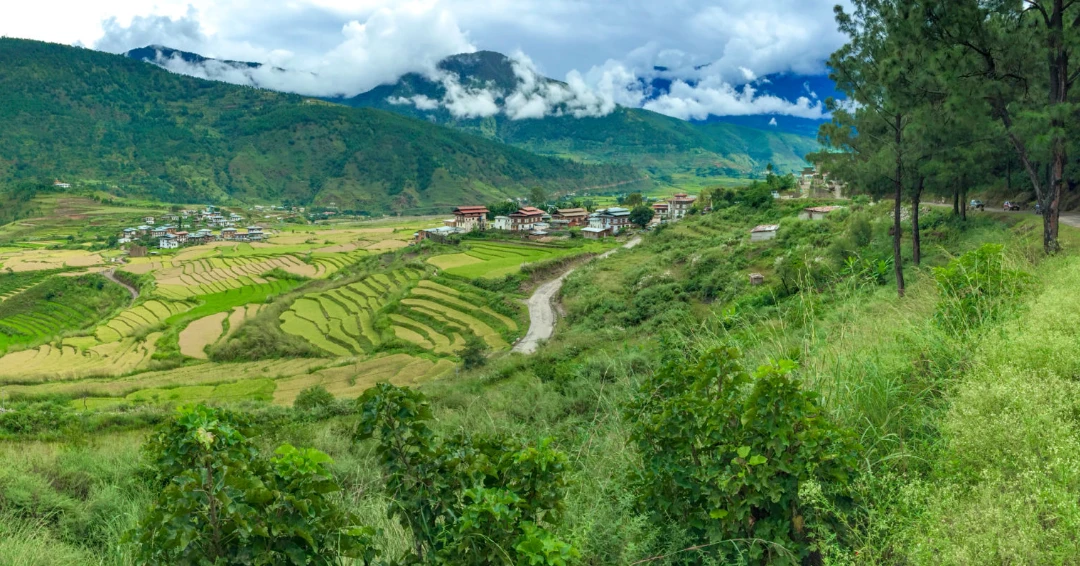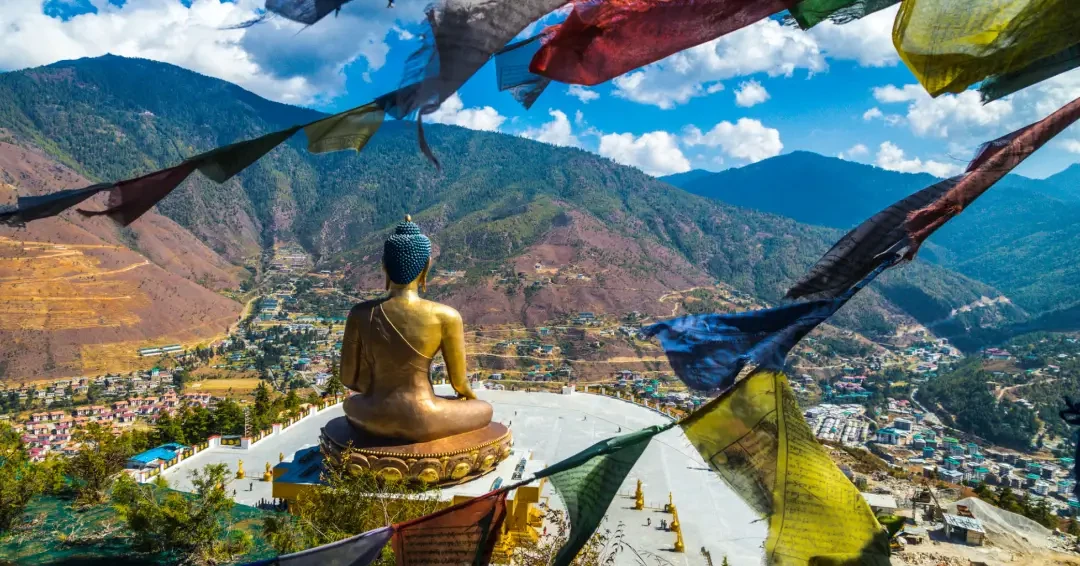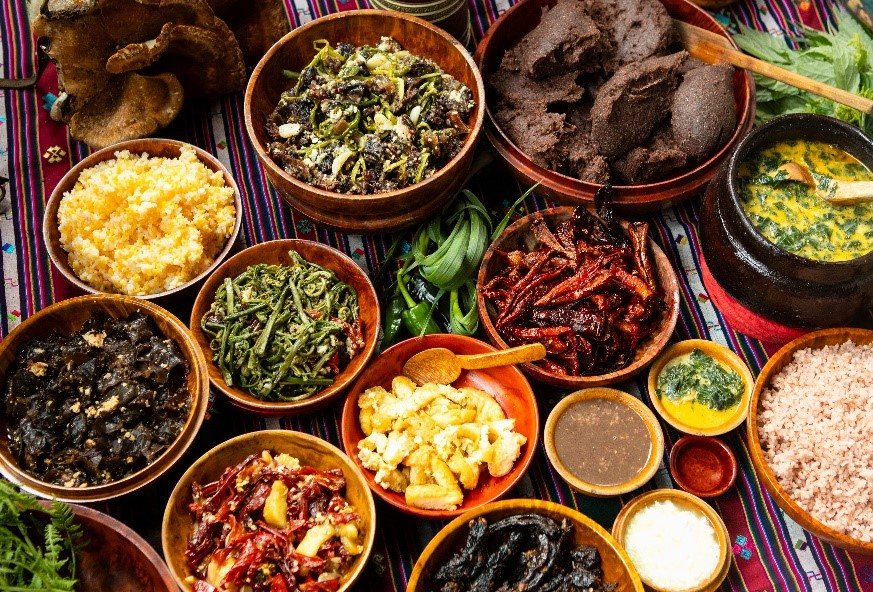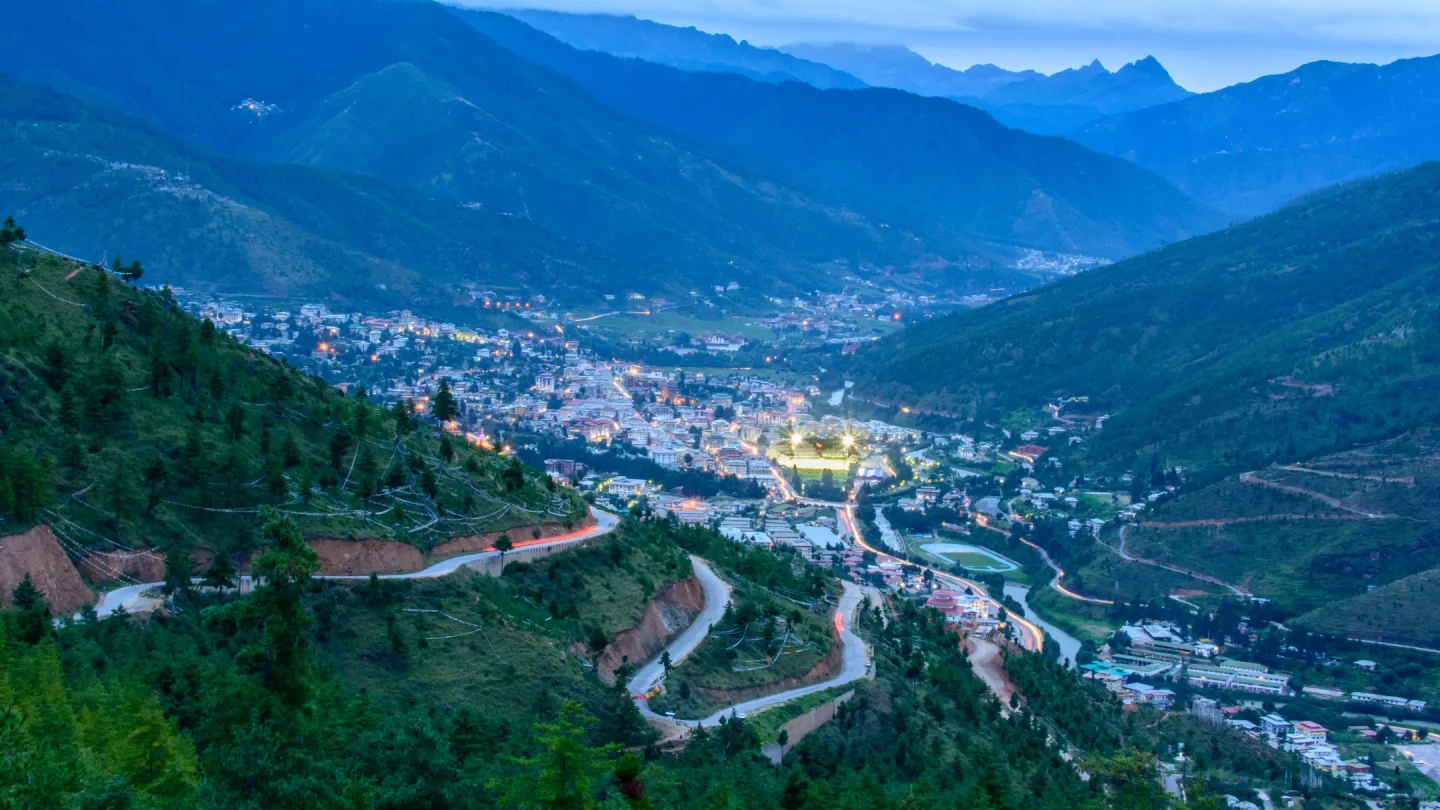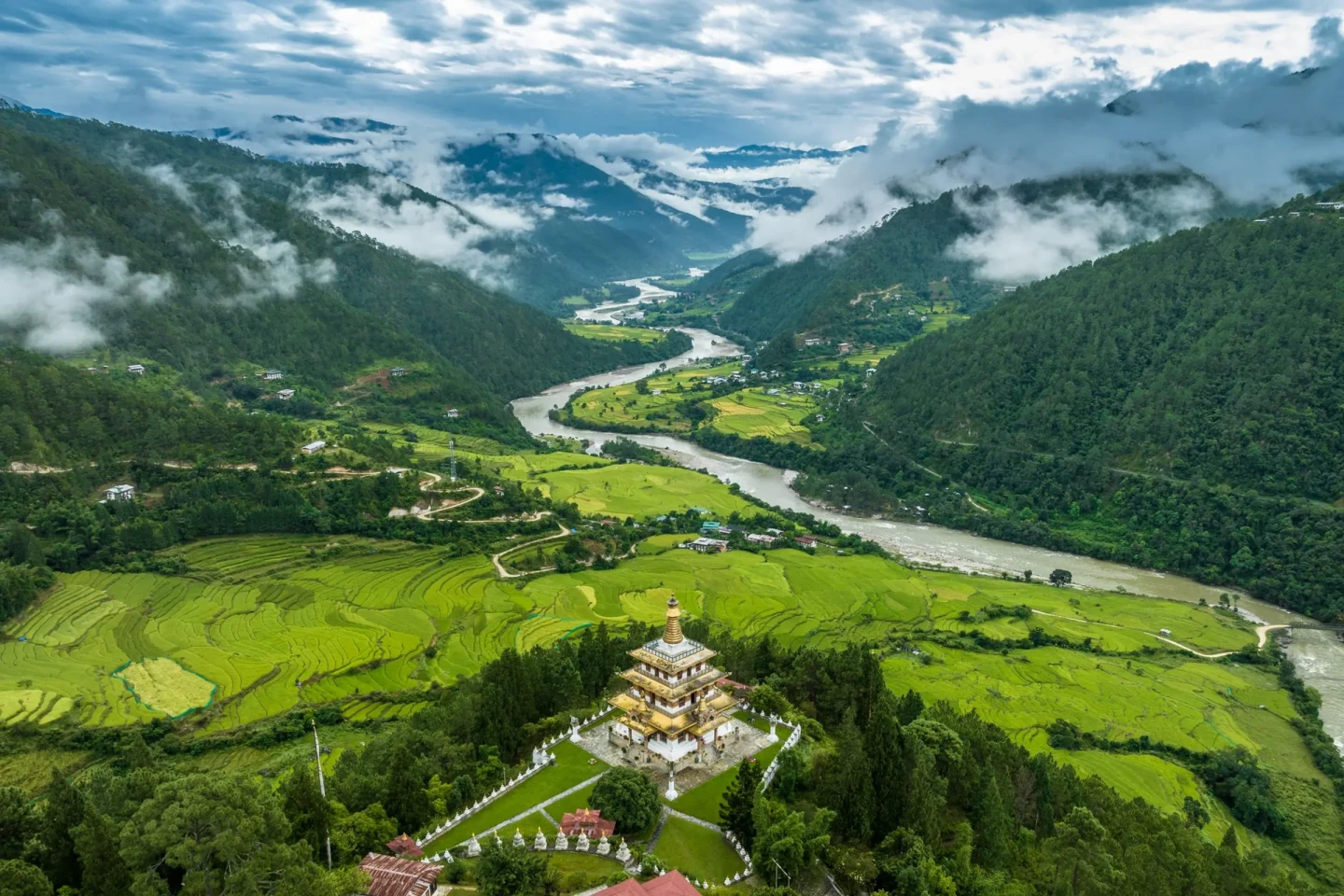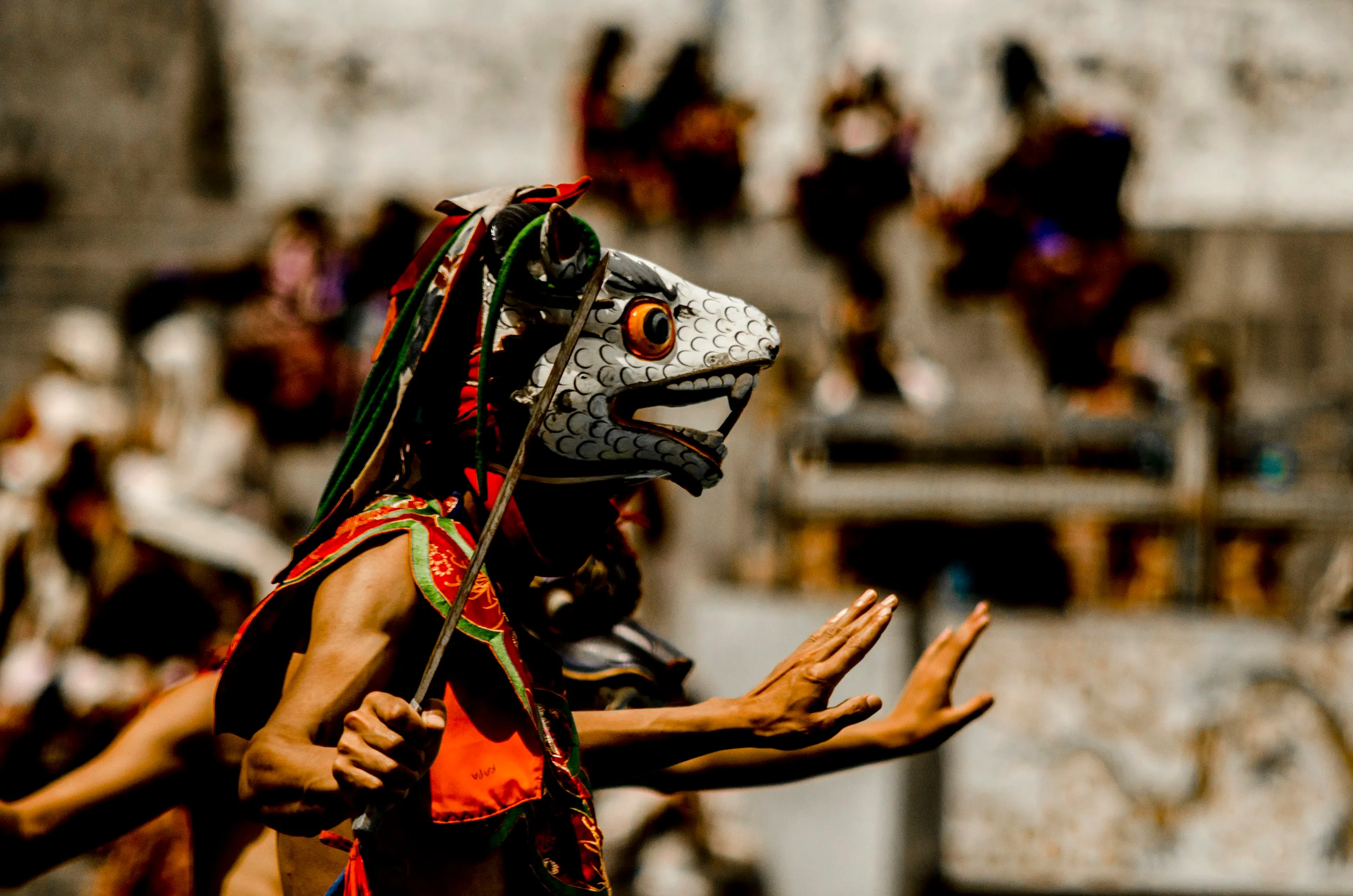Bhutan, the enchanting Kingdom nestled in the Eastern Himalayas, beckons Bulgarian travelers with its pristine landscapes, profound spiritual heritage, and a way of life that prioritizes happiness over material wealth. As a landlocked nation bordered by India and China, Bhutan offers a stark yet captivating contrast to Bulgaria's Balkan charm—both countries boast rugged mountains, with Bhutan's soaring Himalayan peaks echoing the majesty of Bulgaria's Rila and Pirin ranges, yet differing in scale and cultural context. While Bulgaria's history is steeped in Thracian, Roman, and Ottoman influences, leading to a vibrant Orthodox Christian tradition and a republic forged through centuries of resilience, Bhutan remains a constitutional monarchy guided by Vajrayana Buddhism, where ancient fortresses and monasteries dot the terrain much like Bulgaria's medieval castles and churches. Diplomatic ties between the two nations are informal, with no established embassies, but Bhutan maintains relations with the European Union, of which Bulgaria is a proud member since 2007, fostering potential for cultural exchanges and mutual appreciation. For Bulgarians accustomed to the temperate climates and bustling cities of Sofia or Plovdiv, Bhutan presents a slower, more introspective journey, free from the commercial hustle, where the air is crisp with the scent of pine and incense, and the philosophy of Gross National Happiness invites reflection on life's deeper joys. This guide, crafted by an experienced Bhutanese travel consultant, aims to equip you with the knowledge to navigate this unique destination, blending practical advice with insights into its soul-stirring nuances, ensuring your visit is not just a trip but a transformative experience.
Visa and Entry Requirements
Entering Bhutan requires careful planning due to its controlled tourism policy, designed to preserve the kingdom's environment, culture, and infrastructure by limiting visitor numbers and ensuring high-value, low-impact travel. For Bulgarian citizens, a visa is mandatory, and it must be obtained prior to arrival through a licensed Bhutanese tour operator, as independent travel is not permitted for most foreigners. The process begins with selecting a certified operator who will handle the visa application on your behalf; you'll need to provide a scanned copy of your passport, valid for at least six months beyond your planned departure from Bhutan, a recent passport-sized photo, your flight itinerary, and proof of travel insurance. Once your tour is booked and a minimum deposit paid—typically covering the full tour cost including the Sustainable Development Fee (SDF)—the operator submits your application to the Tourism Council of Bhutan and the Immigration Department. Approval usually takes about five working days, after which you'll receive an electronic visa clearance letter via email, which you must present at your point of entry, such as Paro International Airport, to receive the actual visa stamp. The SDF, a key component of Bhutan's tourism model, stands at US$100 per person per night as of 2025, reduced from previous rates to encourage longer stays until 2027, and it funds initiatives like free education, healthcare, and environmental conservation. This fee is integrated into your tour package pricing, making the overall cost transparent but higher than typical vacations, as it ensures all visitors contribute directly to Bhutan's sustainability. Children under six are exempt, while those aged six to twelve pay half, but note that failure to pay the SDF in advance will prevent visa issuance. This system not only secures your entry but also guarantees a guided, responsible exploration, aligning with Bhutan's ethos of mindful tourism.
Travel Routes from Bulgaria to Bhutan
Reaching Bhutan from Bulgaria involves a multi-leg journey, as there are no direct flights between the two countries, reflecting Bhutan's remote location and limited international connectivity. Most Bulgarian travelers depart from Sofia Airport (SOF), the nation's primary hub, with common routes transiting through major Asian or Middle Eastern gateways before connecting to Paro International Airport (PBH), Bhutan's sole international entry point. Popular itineraries include flying with Turkish Airlines from Sofia to Istanbul, then onward to Kathmandu or Delhi, where you can board Drukair (Royal Bhutan Airlines) or Bhutan Airlines, the only two carriers authorized to operate into Paro due to its challenging high-altitude runway surrounded by mountains. For instance, a typical route might involve Qatar Airways from Sofia to Doha, followed by a connection to Delhi and then a Drukair flight to Paro, totaling around 15 to 20 hours including layovers. Alternatives via Bangkok are possible with airlines like Thai Airways, but expect seasonal variations and potential delays, as Paro's airport operates only during daylight hours and is prone to weather disruptions like fog or strong winds, which can ground flights for hours or days. Booking should be done well in advance—ideally three to six months—through your tour operator, who can coordinate seamless connections and handle any rescheduling. Realistic expectations include preparing for jet lag from the time difference (Bhutan is three hours ahead of Bulgaria in summer) and carrying essentials for layovers, as transit visas may be required in countries like India or Nepal. While the journey demands patience, the breathtaking aerial views of the Himalayas upon approach to Paro make it a memorable prelude to your Bhutanese adventure.
Best Time to Visit and Seasonality
Bhutan's diverse topography, ranging from subtropical valleys to alpine heights, creates distinct seasons that profoundly influence travel experiences, requiring Bulgarian visitors to align their plans with weather patterns, cultural events, and personal preferences for activities. Spring (March to May) brings mild temperatures averaging 10-20°C in lower regions, with blooming rhododendrons and clear skies ideal for trekking and sightseeing, though occasional showers can occur; this period sees moderate crowds and coincides with festivals like the Paro Tshechu, offering vibrant mask dances and communal celebrations. Summer (June to August) introduces the monsoon, with heavy rains in the south leading to lush greenery but slippery roads and leech-infested trails, making it less favorable for outdoor pursuits—yet it's a time for mushroom foraging and quieter visits to monasteries. Autumn (September to November) is widely regarded as the prime season, featuring crisp air (5-15°C), golden harvests, and festivals such as the Thimphu Tshechu, with low rainfall ensuring excellent visibility for Himalayan vistas and minimal crowds post-monsoon. Winter (December to February) delivers cold snaps, with temperatures dipping below freezing at higher elevations and snowfall closing some passes, but it rewards with serene landscapes, birdwatching opportunities, and the Black-Necked Crane Festival in Phobjikha Valley. For Bulgarian tourists, accustomed to continental winters and summers, autumn or spring are recommended for comfortable weather, balanced activity options like hiking the Tiger's Nest, and fewer visitors compared to peak times in Europe, allowing a more immersive cultural dive without the intensity of monsoons or extreme cold.
Money, Costs, and Payment Methods
Bhutan's currency, the Ngultrum (BTN), is pegged to the Indian Rupee at par value, facilitating easy exchanges, but Bulgarian travelers should prepare for a cash-dominant economy where modern conveniences are limited. Upon arrival, exchange Euros or US Dollars at Paro Airport, banks in Thimphu or Paro, or authorized hotels, as the Bulgarian Lev is not commonly accepted and rates for other currencies can vary. ATMs are available in major towns like Thimphu, Paro, and Punakha, operated by banks such as Bhutan National Bank or Bank of Bhutan, but they may not always accept international cards—Visa and Mastercard are more reliable than others—and rural areas often lack them, so withdraw sufficient cash early. Credit cards are accepted at upscale hotels and some souvenir shops, but expect surcharges and unreliable networks; mobile payments like Bhutanese apps are emerging but not tourist-friendly yet. Tour packages typically include accommodations, meals, transportation, English-speaking guides, and entrance fees, with costs inflated by the SDF, but extras like alcoholic beverages, souvenirs, tips (US$10-15 per day for guides and drivers), and personal expenses such as laundry remain out-of-pocket. Carrying a mix of small-denomination Ngultrum and crisp US Dollars is advisable for tipping and minor purchases, as change can be scarce in remote spots, ensuring smooth transactions in this largely cash-based society.
Health, Safety, and Travel Insurance
Health considerations in Bhutan revolve around its high-altitude terrain and remote medical facilities, demanding proactive measures from Bulgarian travelers unaccustomed to such environments. Altitude sickness is a primary risk, with symptoms like headaches, nausea, and fatigue emerging above 2,500 meters—common in places like Thimphu (2,300m) or during treks—necessitating gradual acclimatization, hydration, and avoidance of alcohol initially. Recommended vaccinations include hepatitis A and B, typhoid, and rabies, especially for rural stays, while routine shots like tetanus and measles should be updated; consult a travel clinic in Sofia at least four weeks prior, as no yellow fever certificate is required unless arriving from infected areas. Medical facilities are basic outside major towns, with Jigme Dorji Wangchuck National Referral Hospital in Thimphu offering the best care, but evacuation for serious issues is often needed, underscoring the essentiality of comprehensive travel insurance covering high-altitude activities, emergency helicopter rescues (costing thousands of dollars), and medical repatriation. Bhutan is remarkably safe, with low crime rates due to its close-knit communities and Buddhist values, but minor risks include stray dogs (prompting rabies precautions), uneven paths leading to slips, and occasional petty theft in tourist areas. Exercise standard vigilance, respect local customs to avoid misunderstandings, and register with the Bulgarian Ministry of Foreign Affairs for updates, ensuring a worry-free journey in this peaceful haven.
Cultural Etiquette and Social Expectations
Bhutanese society is deeply rooted in Buddhist principles of respect, humility, and harmony, requiring Bulgarian visitors to adapt their behaviors to foster positive interactions and avoid unintentional offenses. When visiting temples, monasteries, or dzongs (fortress-monasteries), remove hats and shoes, dress modestly in long pants and sleeves covering shoulders—women might consider scarves for added propriety—and speak softly, as these are sacred spaces where photography or loud conversations can disrupt monks' meditations. Greeting with a slight bow and "Kuzuzangpo la" (hello) shows appreciation, while offering or receiving items with both hands signifies respect; avoid pointing feet at people or religious icons, as feet are considered lowly. Patience is paramount in social exchanges, given Bhutan's unhurried pace—delays in service stem from a cultural emphasis on mindfulness rather than inefficiency—and humility trumps assertiveness, so Bulgarians, known for direct communication, may need to soften their approach to align with Bhutanese politeness. Public displays of affection are rare and best minimized, and modesty extends to clothing, discouraging revealing outfits even in warmer valleys. Engaging with locals through shared tea or archery games builds rapport, but always ask permission before photographing individuals, honoring their privacy. By embracing these nuances, travelers not only show cultural sensitivity but also enrich their understanding of a society where compassion and interconnectedness define daily life.
Connectivity, SIM Cards, Internet Access
Staying connected in Bhutan is feasible but requires planning, as infrastructure varies from reliable in urban centers to spotty in remote valleys, mirroring the kingdom's balanced approach to modernization. Wi-Fi is widely available in hotels, guesthouses, and cafes in Thimphu, Paro, and Punakha, often free but with speeds suitable for basic browsing rather than streaming; expect occasional outages due to power fluctuations or weather. For mobile data, tourists can purchase local SIM cards from B-Mobile (Bhutan Telecom) or TashiCell, the two main providers, at Paro Airport, operator outlets in towns, or through your tour guide upon arrival—bring your passport for registration, as it's mandatory. Prepaid tourist packages start at around BTN 200 (about €2.50) for a week, including data (2-5GB), calls, and texts, with TashiCell offering strong coverage in eastern regions and B-Mobile in the west; top-ups are easy via scratch cards or apps. Bulgarian apps like Viber or WhatsApp work well for international communication, but some services may face restrictions due to Bhutan's internet policies, making a VPN useful for unrestricted access or privacy. Signal strength diminishes in high mountains or during treks, so inform family of potential gaps, and rely on your guide's local knowledge for hotspots, ensuring connectivity enhances rather than detracts from your immersion in Bhutan's serene landscapes.
Language and Communication
Dzongkha serves as Bhutan's national language, a Tibeto-Burman tongue spoken in official and religious contexts, but English is the medium of instruction in schools and prevalent in tourism, easing communication for Bulgarian travelers whose English proficiency is often strong. Licensed guides, mandatory for all tours, are fluent in English, providing detailed explanations of sites and customs, though Bulgarian-speaking guides are virtually nonexistent due to the niche market—request one in advance if needed, but expect reliance on English or a translator app. In hotels, restaurants, and shops catering to tourists, staff communicate effectively in English, while rural villagers may use basic phrases or gestures, highlighting the value of learning simple Dzongkha words like "thank you" (kadinche la) to bridge gaps and show respect. For those with limited English, visual aids, translation apps like Google Translate (with offline Dzongkha packs), or your guide as an interpreter prove invaluable, especially in markets or homestays. Non-verbal cues, such as smiles and nods, transcend barriers in this hospitable culture, where patience and openness foster meaningful exchanges, allowing Bulgarians to navigate linguistic nuances while appreciating Bhutan's multilingual tapestry of over 19 dialects.
Packing and Preparation Advice
Packing for Bhutan demands versatility to handle its microclimates, from warm subtropical valleys to chilly Himalayan heights, alongside practical items for a destination with limited shopping options. Layered clothing is essential: pack breathable cotton shirts, fleece jackets, and waterproof windbreakers for variable weather, plus sturdy hiking boots for treks and comfortable walking shoes for monastery visits—avoid open-toed sandals due to uneven terrain and cultural norms. Warm accessories like hats, gloves, and scarves are crucial for evenings or higher altitudes, while modest attire (long pants, covered shoulders) respects religious sites; include a reusable water bottle for hydration and eco-friendliness. Medications should cover altitude sickness (consult a doctor for acetazolamide), common ailments like diarrhea or colds, plus personal prescriptions, as pharmacies are sparse outside towns. Power adapters for Type D, F, or G sockets (220V), a universal charger, and portable battery packs address intermittent electricity; don't forget sunscreen, insect repellent, and a first-aid kit for remote areas. Binoculars enhance wildlife spotting, a journal captures reflections, and cash in small denominations handles tips—pack light overall, as tours involve vehicle travel and porters for treks. For Bulgarian travelers, accustomed to Europe's conveniences, including snacks for familiar tastes and a VPN for digital access ensures comfort in Bhutan's Himalayan conditions.
Bhutan’s Unique Tourism Philosophy
At the heart of Bhutan's tourism lies the philosophy of Gross National Happiness (GNH), a holistic framework pioneered by the Fourth King in the 1970s, which measures progress through psychological well-being, health, education, cultural diversity, and environmental sustainability rather than GDP alone. This ethos shapes the kingdom's cautious approach to visitors, prioritizing quality over quantity to prevent the cultural erosion and environmental degradation seen in other destinations. By mandating tours through licensed operators and imposing the SDF, Bhutan ensures tourism benefits locals directly—funding community projects while limiting numbers to maintain authenticity. For Bulgarian travelers, who may draw parallels to their own post-communist emphasis on sustainable development within the EU, understanding GNH reveals why Bhutan resists rapid modernization: skyscrapers and mass tourism could dilute its Buddhist heritage and pristine ecosystems, where over 70% of land remains forested. Instead, the policy fosters immersive experiences, like staying in family-run guesthouses or participating in archery contests, encouraging visitors to contribute positively. This deliberate restraint preserves Bhutan's magic, inviting reflection on how happiness stems from balance, not excess, and why the kingdom remains a beacon for mindful travel.
Mindset and Expectations for Visitors
Approaching Bhutan with an open mindset is key, as its slower rhythm and modest infrastructure contrast sharply with Bulgaria's efficient urban life, emphasizing spiritual and natural fulfillment over convenience. Expect a pace where meals linger in conversation and journeys wind through scenic but bumpy roads, fostering patience as a virtue—delays from weather or festivals are opportunities for serendipity, not frustrations. Accommodations are cozy family hotels or eco-lodges, clean and comfortable but lacking five-star luxuries like spas or room service, aligning with GNH's simplicity. Nightlife is absent, with evenings best spent stargazing or sharing stories by firelight, while shopping focuses on artisanal crafts rather than malls. Infrastructure, though improving, means occasional power cuts or limited hot water, viewed as part of the authentic experience. For Bulgarians seeking respite from fast-paced Europe, reset expectations to value hiking pristine trails, meditating in ancient monasteries, and connecting with warm locals over material indulgences, discovering profound peace in Bhutan's unhurried, soul-nourishing world.
Food and Dining Culture
Bhutanese cuisine reflects the kingdom's agrarian roots and Himalayan influences, characterized by hearty, spicy flavors that warm against the cool climate, often centering on rice, vegetables, and dairy with a liberal use of chilies as a vegetable rather than spice. Signature dishes include ema datshi, a comforting stew of green chilies simmered in yak or cow cheese, paired with red rice for a nutty, filling base; variations like kewa datshi (potatoes and cheese) or shamu datshi (mushrooms and cheese) showcase the cheese-heavy palette, while phaksha paa (pork with radish and chilies) adds protein for non-vegetarians. Dining is communal and hospitable, with meals served family-style in homes or restaurants, where hosts offer seconds generously—politely accepting shows appreciation, but overeating is avoided in line with Buddhist moderation. Tea plays a central role: suja (butter tea) provides salty sustenance, while ngaja (sweet milk tea) offers familiarity; ara, a fermented rice wine, and locally brewed beers accompany celebrations, though alcohol is consumed mindfully. For Bulgarian palates, accustomed to yogurt and grilled meats, the spiciness may require adjustment—request milder versions initially—but embracing these simple, fresh ingredients fosters cultural connection, as food embodies Bhutan's ethos of sharing and nourishment.
Festivals, Religion, and Sacred Places
Religion permeates every aspect of Bhutanese life, with Vajrayana Buddhism guiding daily practices, architecture, and festivals that offer profound insights for visitors. Sacred sites like Taktsang Monastery (Tiger's Nest) or Punakha Dzong are not mere attractions but living spiritual centers, where monks chant prayers and pilgrims spin wheels for merit—tourists must enter clockwise, remove shoes, and refrain from touching artifacts, observing silence to honor the sanctity. Festivals, or tshechus, held annually in dzongs, feature elaborate mask dances depicting Buddhist tales, colorful costumes, and communal blessings, such as the Paro Tshechu in spring, drawing locals in traditional attire for archery and feasting. Attending requires respectful dress and no flash photography during performances, as these events reinforce moral teachings and social bonds. For Bulgarian travelers, familiar with Orthodox rituals, these experiences highlight parallels in devotion yet unique expressions through tantric elements and guru veneration, deepening appreciation for how religion sustains Bhutan's cultural fabric and invites personal introspection amid vibrant pageantry.
Hidden Challenges and Practical Inconveniences
While Bhutan's allure lies in its authenticity, travelers may encounter subtle challenges that, when viewed positively, enhance the adventure's charm rather than detract from it. Road conditions, often winding and unpaved in mountainous areas, can lead to bumpy rides and travel times longer than expected, but they afford stunning views and a sense of exploration akin to traversing Bulgaria's rural paths. Power outages are occasional, stemming from hydroelectric reliance and remote locations, yet candlelit evenings foster intimate conversations and a break from digital distractions. Service in restaurants or hotels may seem leisurely, reflecting a cultural focus on presence over haste, encouraging patience as a form of mindfulness. Itinerary changes due to weather—monsoons washing out bridges or fog delaying flights—are common, but guides adeptly adapt, turning detours into unexpected discoveries like hidden villages. These inconveniences, far from flaws, embody Bhutan's unpolished essence, teaching resilience and appreciation for simplicity, much like navigating seasonal disruptions in the Balkans, ultimately enriching the journey with genuine, unscripted moments.
Shopping and Souvenirs
Shopping in Bhutan centers on authentic handicrafts that embody the kingdom's artistic heritage, offering Bulgarian travelers meaningful mementos rather than mass-produced goods found in European malls. Markets in Thimphu or Paro brim with handwoven textiles like kira (women's wraps) and gho (men's robes) in vibrant patterns, crafted from yak wool or silk using traditional looms—look for the Thirteen Traditional Crafts certification to ensure genuineness. Incense, made from Himalayan herbs, and wooden masks from festivals provide aromatic and decorative souvenirs, while Bhutanese jewelry, prayer flags, and thangka paintings reflect spiritual motifs. Bargaining is mild and respectful, often a friendly negotiation rather than aggressive haggling, as fixed prices prevail in government emporiums for quality assurance. Avoid endangered animal products, adhering to CITES regulations, and shop at cooperatives to support artisans directly. With no duty-free extravaganzas or luxury brands, purchases emphasize cultural value, allowing visitors to carry home pieces of Bhutan's soul, much like sourcing folk crafts in Bulgarian villages.
Altitude Awareness and Physical Preparedness
Altitude's effects in Bhutan vary by individual, with many sites above 2,500 meters posing risks like acute mountain sickness (AMS), characterized by headaches, dizziness, shortness of breath, and insomnia—symptoms that can onset within hours and worsen without acclimatization. Bulgarian travelers, from a lower-altitude homeland, should prepare by building cardiovascular fitness through pre-trip hikes or stair climbing, aiming for gradual exposure upon arrival: spend initial days in Paro (2,200m) before ascending to Thimphu or higher treks. Hydration is critical—drink 3-4 liters daily, avoiding caffeine and alcohol initially—while a diet rich in carbohydrates aids energy. Monitor symptoms vigilantly; descend if severe, and consider prophylactic medications like Diamox after medical consultation. Physical activities, from moderate walks to demanding treks like the Druk Path, require pacing: walk slowly, breathe deeply, and rest frequently. By respecting your body's signals and preparing mentally for fatigue, the challenges become gateways to Bhutan's ethereal heights, ensuring safe enjoyment of its majestic landscapes.
Security, Safety, and Emergency Information
Bhutan's reputation as one of the world's safest destinations is well-earned, with negligible violent crime and a society bound by Buddhist ethics, allowing Bulgarian travelers to explore with peace of mind, though basic precautions enhance security. Petty theft is rare but possible in crowded festivals, so secure valuables in hotel safes and carry photocopies of documents. Emergency contacts include police at 113, medical services at 112, and your tour guide as the first responder; for Bulgarians, the nearest embassy support is via the Bulgarian mission in New Delhi, India, reachable at +91-11-2611-5549, as no direct representation exists in Bhutan. Respect local laws, such as bans on tobacco sales (import limited) and wildlife poaching, to avoid fines. Natural hazards like landslides during monsoons warrant heeding guide advice on routes. Overall, the kingdom's tranquility, bolstered by vigilant communities, ensures a secure visit, with insurance and registration at Bulgaria's MFA providing added layers of protection.
Photography and Drones
Photography in Bhutan captures its stunning vistas and cultural richness, but rules safeguard sensitive sites and privacy, requiring thoughtful conduct from visitors. In monasteries, dzongs, and government buildings, seek permission before shooting—flash is prohibited indoors to preserve artifacts, and certain sacred areas ban cameras entirely, marked by signs. Photographing locals demands consent, often granted with a smile, but respect refusals, especially of monks or children, to honor dignity. Drones are heavily regulated as of 2025, primarily restricted to government use for security reasons; tourists must obtain rare permits from the Bhutan Civil Aviation Authority in advance, limited to 90 meters altitude and visual line-of-sight, with bans over religious sites, borders, and crowds—violations incur fines or confiscation. Frame drone aspirations modestly, focusing instead on handheld photography's intimacy, ensuring your captures respect Bhutan's sanctity while preserving memories ethically.
What Bhutan Does Not Have
Bhutan's deliberate preservation of its identity means an absence of elements common in modern destinations, which Bulgarian travelers might notice but come to cherish as part of its allure. No skyscrapers pierce the skyline, as building heights are capped to maintain traditional architecture; fast-food chains and casinos are nonexistent, aligning with GNH's aversion to consumerism and gambling. Large shopping centers yield to artisan markets, and nightlife hubs are replaced by quiet evenings, emphasizing introspection over excess. This lack fosters a purer connection to nature and culture, highlighting Bhutan's unique charm in a world of homogenization.
Important Questions to Ask Before Booking a Tour
Before committing to a Bhutanese tour operator, Bulgarian travelers should engage in thorough discussions to ensure the experience aligns with their needs and expectations, starting with inquiries about the guide's qualifications and language skills—ask if they are licensed by the Tourism Council, how many years of experience they have, and whether they can communicate effectively in English, as Bulgarian options are scarce but English proficiency is standard. Delve into itinerary flexibility: question how adaptable the schedule is to weather changes, personal fitness levels, or spontaneous interests like extending a festival visit, and confirm if private customizations are possible without extra fees. On accommodations, probe the types offered—will they be comfortable hotels or homestays, with details on amenities like heating, Wi-Fi, and dietary accommodations for preferences like less spicy food. Food is another key area: inquire about meal inclusions, options for vegetarian or allergy-friendly dishes, and exposure to authentic Bhutanese cuisine versus international alternatives. Emergency protocols deserve attention—ask about medical support, evacuation plans, and insurance requirements, including coverage for altitude-related issues. Practicalities like SIM cards should be covered: will the operator assist in obtaining a local one upon arrival, and what data plans suit international calls? Tipping customs vary, so clarify expected amounts for guides and drivers, typically US$10-15 daily. Finally, discuss overall insurance: does the tour mandate comprehensive coverage, and what contingencies like trip cancellations are addressed? These conversational queries build trust, ensuring a seamless, personalized journey.
Conclusion
In reflecting on Bhutan as a destination for Bulgarian travelers, one cannot overlook its rarity as a sanctuary of untouched beauty, where the pursuit of Gross National Happiness invites a departure from the commercialized rush of modern vacations toward profound cultural immersion, serene natural wonders, and spiritual rejuvenation. For those from Bulgaria's historic lands, Bhutan offers a mirror to shared values of resilience and heritage preservation, yet in a Himalayan context that awakens the senses to new depths of peace and connection. Embracing its nuances—from spicy feasts to monastery whispers—yields not just memories, but a renewed perspective on life's essentials, making it an unparalleled choice for seekers of authentic, soulful escapes.





